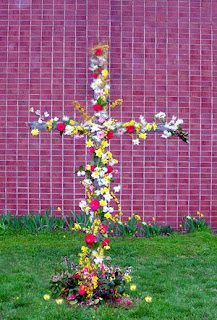 Let's go back to the first part of the poem and read it again.
Let's go back to the first part of the poem and read it again.Listen! The choicest of visions I wish to tell,
which came as a dream in middle-night,
after voice-bearers lay at rest.
It seemed that I saw a most wondrous tree
born aloft, wound round by light,
brightest of beams. All was that beacon
sprinkled with gold. Gems stood
fair at earth's corners; there likewise five
shone on the shoulder-span . All there beheld the Angel of God,
fair through predestiny. Indeed, that was no wicked one's gallows,
but holy souls beheld it there,
men over earth, and all this great creation.
Wondrous that victory-beam--and I stained with sins,
with wounds of disgrace. I saw glory's tree
honored with trappings, shining with joys,
decked with gold; gems had
wrapped that forest tree worthily round.
Yet through that gold I clearly perceived
old strife of wretches , when first it began
to bleed on its right side. With sorrows most troubled,
I feared that fair sight.
 Listen! As an opening that's up there with 'Aegis bearing Zeus' and 'Stately, plump Buck Mulligan' , our attention is caught but rather than transporting us back to battlefields of Greece waiting for an epic tale of war and heroism, or to the Martello Tower in Dublin Bay awaiting Stephen's whirlwind but incredibly detailed 'book of the day' walk through the city, we are transported to a dark age of eighth century English history. 'Listen!, and your soul shall live!' we can imagine Caedmon saying to a crowd in a darkened hut, with the wind and rain battling down outside, as he taught the Christian religion through this poem. The Ruthwell Cross above shows much of the action of the Dream and gives us a time frame for this imaginary meeting with the wandering bard.
Listen! As an opening that's up there with 'Aegis bearing Zeus' and 'Stately, plump Buck Mulligan' , our attention is caught but rather than transporting us back to battlefields of Greece waiting for an epic tale of war and heroism, or to the Martello Tower in Dublin Bay awaiting Stephen's whirlwind but incredibly detailed 'book of the day' walk through the city, we are transported to a dark age of eighth century English history. 'Listen!, and your soul shall live!' we can imagine Caedmon saying to a crowd in a darkened hut, with the wind and rain battling down outside, as he taught the Christian religion through this poem. The Ruthwell Cross above shows much of the action of the Dream and gives us a time frame for this imaginary meeting with the wandering bard.Caedmon, after exhorting us to listen, explains that he is to recount the 'choicest of visions', which came upon him by night and we can imagine our meeting in the wooden hut in the darkness being a similar night for visions. Caedmon gave a vision of hope and redemption, bringing the hope which the cross brings to a sybaritic people living a conversely hard life from the soil and the sword. He tells of a tree decked with gem stones (a symbol familiar to Anglo Saxon pre Christian legend), but with the angel of God. By making reference to a gallows, he identifies it as the cross, the tree of life stained with the rubies of Christ's blood, as well as bringing the majesty of He who died upon it to the forefront of the minds of the listeners. Listen! A dark hut with a bard telling stories of a tree covered in gems, guarded by an Angel and holy souls - there is a promise of immortality to those who believe in a harsh land, ruled by the sword. The choice of death on the cross and the triumph of death, two notions converse to the life of the audience, will be explored later as we reach the next part.
The protagonist continues his vision by telling of his own sense of unworthiness and sin at seeing such a great symbol, unimaginable wealth and prestige greater than any King or Thane, but this goes deeper, as he 'clearly perceived old strife of wretches', he came to some understanding, in his vision, of the symbolism of the cross. Soon after he also sees the blood staining the right hand of the wood, leading the way to the memorable line 'and all unto whom it came were saved' which echoes throughout scriptures and would be taught to the pagans. Thus the cross is set up to be the way to salvation.
So far in our darkened hut, by the light of the fire, we have heard of the protagonist setting the ground for his vision, which shows a cross covered in gems and guarded by an Angel, but also stained in blood and bearing the memory of great suffering and need - the mystic junction here is the remembrance of old strife and the protagonists 'fear' of the object which has brought his sin to the fore and reminded him of ancient suffering - or ancient need.
This Lent, may the Lord hold his cross before us to remind us of our need of salvation. May we, like the Anglo Saxons, be given the grace to hear the Good News afresh, so to set our hearts on fire with zeal for the conversion of unbelievers, lest we be found guilty of not spreading this joyful news. Pray that as Caedmon found his context in story and poetry, we may find our way of delivering the news afresh to our generation. Send forth your Spirit, O, Lord, that we may be created and you shall, working within us, renew the face of the earth. Amen.
Part two to follow.


_Black_s_s_s_s_s.jpg)
